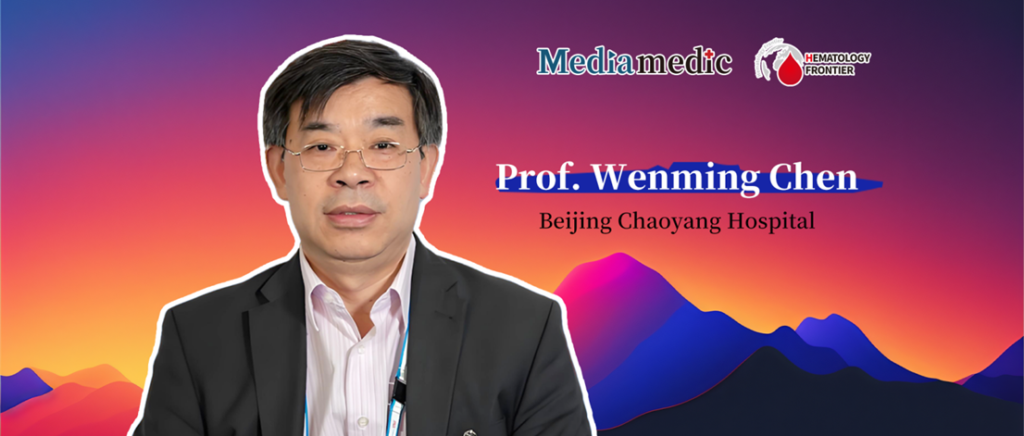
Editor’s Note: On November 15–16, 2024, the "Annual Meeting of the Hematology Committee of the Chinese Medical Education Association—Great Wall Hematology Forum" was successfully held in Beijing. This conference brought together leading experts in hematology to discuss advancements in the diagnosis and treatment of hematological diseases, delve into the latest research findings, and explore the future direction of the field. Hematology Frontier had the honor of interviewing Professor Wenming Chen, Chair of the Hematology Committee and Director of the Hematology Department at Beijing Chaoyang Hospital, who shared highlights of the forum, significant achievements in China’s hematology research, and his insights into nurturing young scholars.Hematology Frontier: The 2024 Annual Meeting of the Hematology Committee of the Chinese Medical Education Association, also known as the Great Wall Hematology Forum, has concluded successfully in Beijing. As the organizer and Chair of the Committee, could you highlight the key aspects and features of this event?
Prof. Wenming Chen: Since its establishment in 2017, the Hematology Committee has grown steadily under the leadership of the Chinese Medical Education Association. It now consists of nine specialized subcommittees, including Leukemia, Myeloma, Lymphoma, MDS/MPN, Hemostasis and Thrombosis, Young Physicians, Hematology Laboratory Diagnosis, Hematology Nursing, and Hematology Surgical Treatment.
Over the past few years, due to the pandemic, the annual meetings of the Hematology Committee were held online. Starting last year, we returned to in-person events, and this year marks the second offline meeting since the pandemic. With the establishment of the subcommittees, each annual meeting now features both a main plenary session and separate subcommittee sessions to foster deeper academic exchanges.
Given its location in Beijing, the meeting is also known as the “Great Wall Hematology Forum.” Through persistent efforts, this forum has become a recognized brand in China, enjoying high visibility and broad influence. The event covers a wide range of hematology topics, features high-quality discussions, and has garnered support from experts nationwide, earning accolades from peers across the country.
Hematology Frontier: In recent years, hematology has witnessed significant advancements, with breakthroughs in both basic research and clinical practice. Could you elaborate on some of the most notable achievements?
Prof. Wenming Chen: In recent years, China has made rapid progress in hematology, excelling in both new drug development and mechanistic research. In multiple myeloma, China is at the forefront globally in developing CAR-T cell therapies and bispecific antibodies. In leukemia, we not only lead in treating acute promyelocytic leukemia but have also achieved significant international impact in researching its pathogenesis.
In lymphoma, China has conducted numerous large-scale, multicenter clinical trials and achieved remarkable results in new drug development, gaining international recognition. Additionally, in hemostasis and thrombosis, particularly in diseases such as hemophilia and immune thrombocytopenia, we have made substantial advances in both mechanistic studies and drug development, establishing a strong presence on the international academic stage.
Overall, the collaboration between China’s clinical and basic research experts has yielded significant achievements in understanding disease mechanisms, prognostic stratification, and drug development. This has continually elevated our international influence, earning widespread respect and recognition. Today, it is no longer unusual for Chinese scholars to serve as keynote speakers or chairs at major international conferences, which marks a significant transformation from the past.
Hematology Frontier: This year’s conference featured a dedicated session for the Young Physicians Committee, highlighting the importance of nurturing young talent. What advice or guidance do you have for aspiring hematologists?
Prof. Wenming Chen: Young physicians represent the future and hope of the nation, and the same is true in the field of hematology. Currently, the Hematology Committee comprises senior experts who serve as academic leaders in various departments or hospitals. However, as time progresses, it is inevitable that these experts will gradually step back from active roles. To ensure the continued development of hematology research and practice, it is essential to foster a new generation of talent.
The establishment of the Young Physicians Committee aims to cultivate young professionals, encouraging them to engage in academic innovation in both basic and clinical research. These individuals are expected to become future academic leaders in their respective fields. Each year, the annual meeting features a dedicated session for young scholars, providing them with a platform to showcase their academic potential and research findings. This not only supports their growth but also propels the entire field of hematology forward.
About Prof. Wenming Chen
Prof. Wenming Chen is the Director of the Hematology Department at Beijing Chaoyang Hospital, Chief Expert of the Beijing Multiple Myeloma Research Center, and Chair of the Hematology Department at Capital Medical University. He leads the Beijing Municipal Health Bureau’s Talent Team and the Multiple Myeloma Key Specialty Program. Prof. Chen holds numerous academic roles, including Member of the International Myeloma Working Group (IMWG), Standing Member of the Asian Myeloma Network (AMN), and recipient of the AMN Distinguished Service Award from the International Myeloma Foundation (IMF).
He has spearheaded over 20 myeloma-related research projects, including national key initiatives, and has secured over 24 million RMB in research funding. Prof. Chen has authored over 300 core papers, including more than 60 SCI-indexed articles, and has led or participated in more than 20 international and domestic multicenter clinical trials as a principal investigator. His contributions continue to inspire the next generation of hematologists and advance the field.


